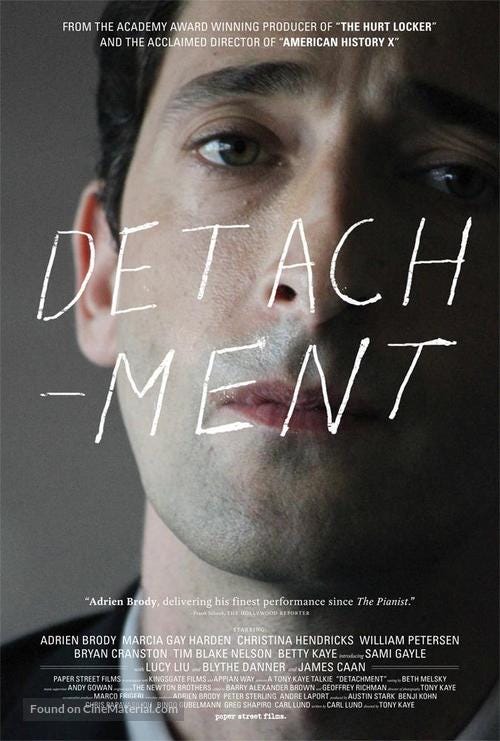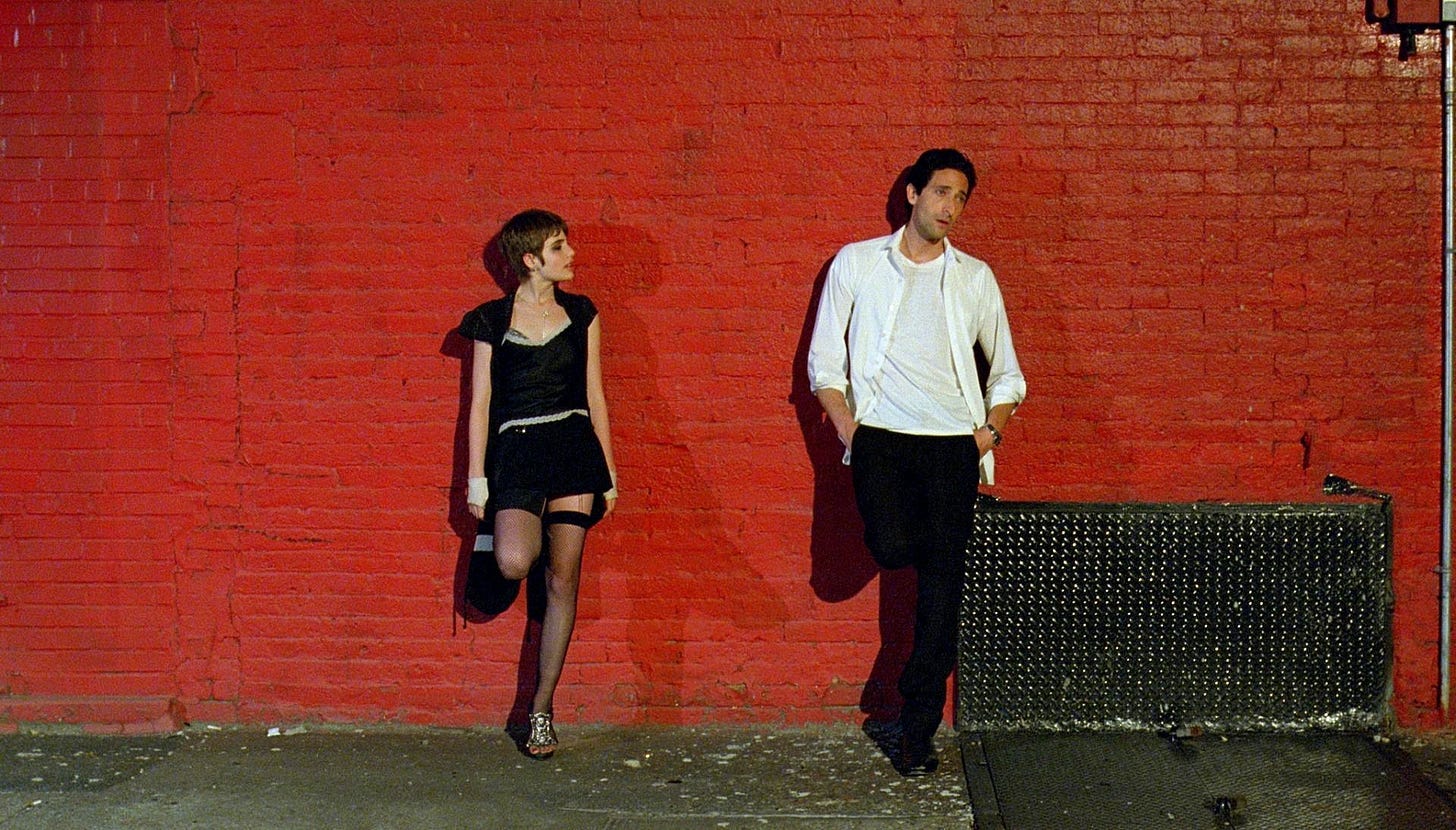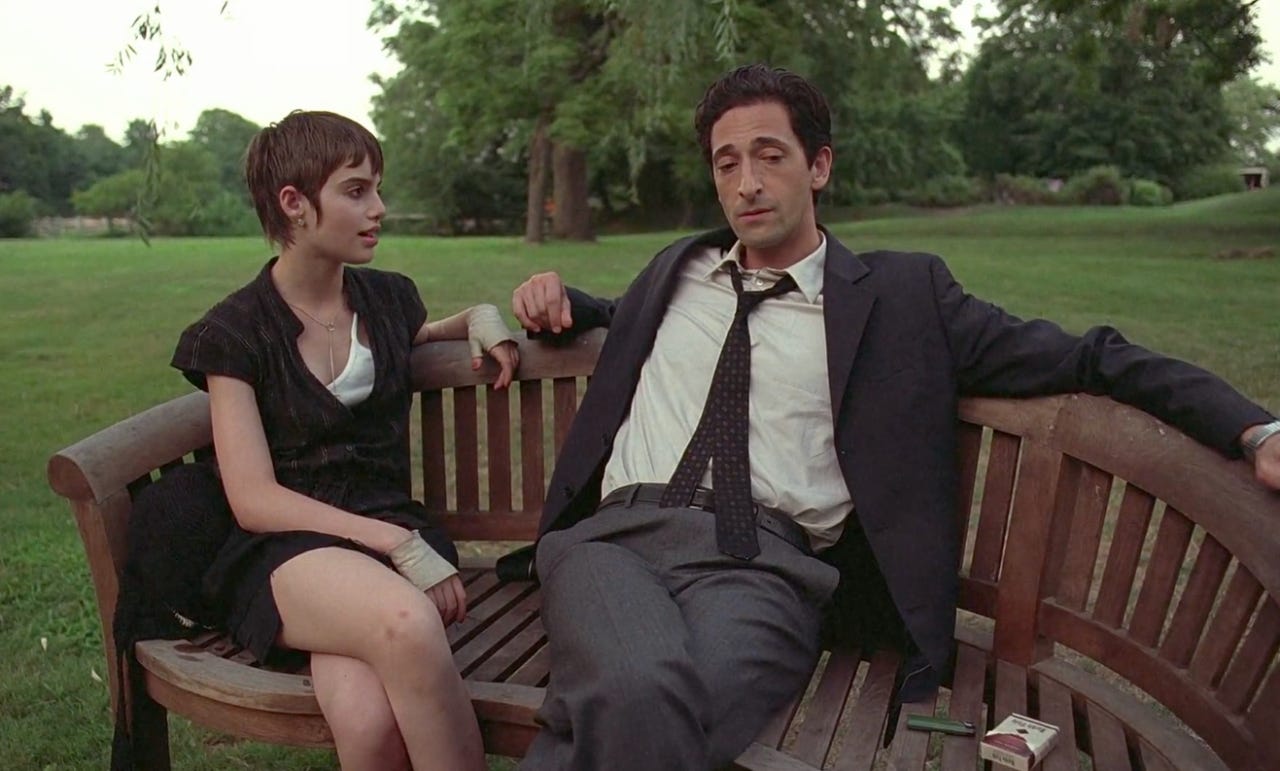Detachment was filmed in 2011, directed by Tony Kaye and stared Adrien Brody as Henry Barthes. It’s flooded with darkness and sadness, it creates such a connection, an attachment and yet it stays always detached. The film is an emotive paradox. Hence, I felt the desire to write this review/essay/analysis of the film.
It’s letterbox summary describes it as “A chronicle of three weeks in the lives of several high school teachers, administrators, and students through the eyes of substitute teacher, Henry Barthes. Henry roams from school to school, imparting modes of knowledge, but never staying long enough to form any semblance of sentient attachment.”
“And never have I felt so deeply at one and at the same time so detached from myself and so present in the world” ~ Albert Camus
My spoiler free review:
Simply, I cannot describe or review this film with any normality. The film is full of subtle complexities and yet you can find everything about it at surface level. It is like a said, a total paradox. But I can tell you, that on my initial watch, I rated it 5 stars. This rating is, admittedly, up for debate, but I have not and likely never will, changed it. Now in ten years, I may look back on this and eat my words, think I was pretentious and immature and that my thoughts on this film were, to put it bluntly, total rubbish. But I find it unlikely, no doubt I’ll think I’m immature, but I doubt the significance of this film will change drastically for me.
Detachment is a film shrouded in grey shots and dark lighting choices, of unusual emotions and even more unusual relationships. And yet it portrays each character with what feels like total honesty (something that isn’t really possible, since the film is, as far as I’m aware, entirely fictional). Where each relationship is abnormal, there is also something so regular about each one that they find a way to stay significant to us, as watchers.
It’s likely that everything following this point with contain spoilers, this is my disclaimer, I have warned you. If you have yet to do so, please watch the film before you come back.
THE TRAILER:
Detachment
/ dɪˈtatʃm(ə)nt/
noun
the state of being objective or aloof. he felt a sense of detachment from what was going on
(note: I removed the other non-relevant definitions.)
Our main character, Henry Barthes is a substitute teacher who has been placed in an English high school class for three weeks, ‘somewhere in the New York metropolitan area’. The idea of detachment, the very title of this film had to come from somewhere. The answers are riddled throughout the film, but perhaps the most prevalent, the most obvious is that of the main character.
The oddity of the character development in Henry Barthes is that he is ultimately detached from everything and yet the film follows him finally finding an attachment, multiple in fact. The amazon prime summary of the film explains “A substitute teacher who drifts from classroom to classroom finds a connection to the students and teachers during his latest assignment.”
At the beginning of this film, his character is portrayed as somewhat separate from everything around him, imparting knowledge, but not truly caring for himself or the situations he finds himself in. “Barthes’ method of imparting vital knowledge to his temporary students is interrupted by the arrival of three women in his life- a damaged and naïve sex worker, Erica (Sami Gayle), a fellow teacher, Sarah (Christina Hendricks), and a troubled teen named Meradith (Betty Kaye).”
I had been planning to write on the camera shots, the filming and the like, something I’m personally very interested in. However, in order to prevent this sounding like a GCSE Media paper, I’ve decided against that, I have however, briefly touched on the subject of lighting and acting despite this. As such, please excuse my ramblings and know, it could have been so much worse!
★★★★★
I have little to say on this subject, as I know little about the topic (the topic being the actual acting) however it should be noted that there was a brilliant performance from each person featured, amounting to a highly impactful and emotive film.
You could argue, through the lighting also, so grey and blank, devoid of bright color’s and symbols, it is all so detached. You can’t link anything together, nothing stands out. How we are manipulated to be detached. Despite the connection you end up feel to each of the characters because each of their stories are so raw and real, there’s still this faint sense of detachment, where despite this connection you still feel separate to them. It’s interesting and fascinating to watch knowing this, where normally you’re either attached to the characters, or you’re not. It shouldn’t be possible to have an in between, yet here it is.
So, I suppose, ultimately you start the film, like the character Henry, devoid of any attachment. But despite this, somewhere along the way, attachments are formed, connections created and as the reality sets in for Henry Barthes, so does it for you. Even if the story, is in actuality, entirely fictional.
“I realized something. I’m a non-person, Sarah. You shouldn’t be here, I’m not here. You may see me but I’m hollow.”
The real stark difference to the rest of the film comes in the form of the main character speaking directly to the audience in what seems like the future. Now he has experienced the films story, he, as the main character can narrate it for us. These are sections of voiceovers as well as close up camera shots of Henry talking directly to the camera. This is one time with significant change in lighting, colour and appearance. The first shot we see in the film is one of these close camera shots of Adrien Brody looking contemplative and slightly melancholy. He begins, initially by speaking to a group of people of screen, asking them to leave, before he looks down, and with some ‘sad piano music’, the credits begin. Straight away, before the film has even properly began, we have this idea that this character is alone, that his story is so deeply personal, he can only tell it to us, the watcher. Why this is, we do not know, we never will.
Now, I do not wish for this to become a play by play, for me to tell you about every little detail in the film. But I thought this starting shot was particularly significant as it truly represents the first half of the Detachment, Henry is with others, talking to others, and somehow strikes us as somewhat lonely. It also speaks to the ambiguity of the film in its entirety. It feels important, but we don’t quite know the whole story, not unlike the film’s ending.
“A child’s intelligent heart can fathom the depth of many dark places, but can it fathom the delicate moment of its own detachment?”
One of the most interesting aspects of the film, for me, was the interactions and relationship between Henry Barthes and Erica, the young runaway prostitute who was played by Brody’s co-star Sami Gayle. Henry Barthes decides, somewhat impulsively, to take in a 15-year-old sex worker who was living on the street. There are a couple of things I find interesting about this relationships; the symbol for hope, the genuine selflessness about the situation and how this is all created. As we’ll discuss briefly later, the ending to this film is one of ambiguity, uncertainty. We can’t quite be sure what happens, if Henry Barthes future following this film is one of happiness, of finding relationships or complete detachment, once again. The one true hope we have is that of his relationship with Erica. There’s this brilliant scene we see right near the end, where Henry visits the home that Erica is staying at. We see them embrace, and that’s it. But it’s enough to spark hope. And the ability to do that, in film, is beautiful, I think, even if it’s just for the future of a fictional character.
The other point, I mentioned, that I found significant was the selflessness in their relationship. Their relationship is not romantic or sexual, they aren’t really friends, it’s almost parental but even then, not quite. There is no label you can put to it, not truly. However, I can claim, with certainty, that their interactions and relationship, as soon as Barthes decided to give her a place to stay, was that of a desire to help the other. No ulterior motives, no care, just aid. Perhaps this is because Henry is still rather detached from the word, but at first Erica seems to mean little to him. He just saw someone he could help, and instinctively helped her. I’m not heading anywhere with this, there is no final statement of conclusive point; I just think their relationship is bittersweet and ever so slightly beautiful.
“we have such a responsibility to guide out young so that they don’t end up falling apart, falling by the wayside, becoming insignificant.”
“The ending of Detachment is ambiguous but optimistic. We are not quite sure if Henry breaks down his walls and accepts people or goes back to being very defensive. However, we are left with an optimistic feeling as he meets Erica at the foster canter. The film also explores various themes related to education, society, and human nature.” says Saurav B. from filmfinesse.
My final point I wished to personally discuss was the message of the film. Now I have a love hate relationship with the mere idea of a films message. On the one hand, I find it limiting to need messages behind every piece of art and film, sometimes nothing is something in itself. But on the other hand, GOD do I love an underlying reason, the symbolism that leads to this ultimate message. So, that leads to the question, ss there a message behind Detachment? Well I decided to find out what others think, and it all seemed to amount to this: “The message of ‘Detachment’ is simply one of responsibility and caring.” Says a reviewed on imdb who’s user I can’t seem to actually find. And I really can’t think of a better way to put it, so I won’t. If there is a message to Detachment, it is one of responsibility and caring.
Finally I thought I’d share some other review and facts about the film:
Detachment Movie Explained: Exploring Ending and Themes (filmfinesse.com)
Detachment – review | Drama films | The Guardian
Detachment (2011) directed by Tony Kaye • Reviews, film + cast • Letterboxd
The cast included Adrien Brody, Christina Hendricks, Marcia Gay Harden, Lucy Liu, Sami Gayle and James Caan amongst others.
The film was directed by Tony Kaye who also directed American History X (1998) and Lake of Fire (2006) and was written by Carl Lund.
“Whatever is on my mind, I say it as I feel it, I’m truthful to myself, I’m young and I’m old, I’ve been bought and I’ve been sold, so many time. I am hard-faced, I am gone. I am just like you.”
And as my slight disclaimer, this wasn’t and isn’t to be taken seriously, it’s not a professional look at the film- I am simply a fan, who wanted to put their thoughts somewhere.
You don’t need to love this film, or even like it. You don’t have to agree with a single thing I’ve said. If you do, that’s great, if you don’t, that’s fine, we all have different taste. But either way, thank you so much for reading this stream of my thoughts.
~Ani
P.s. if it’s of any interest…








